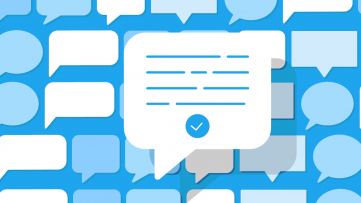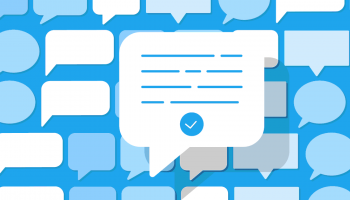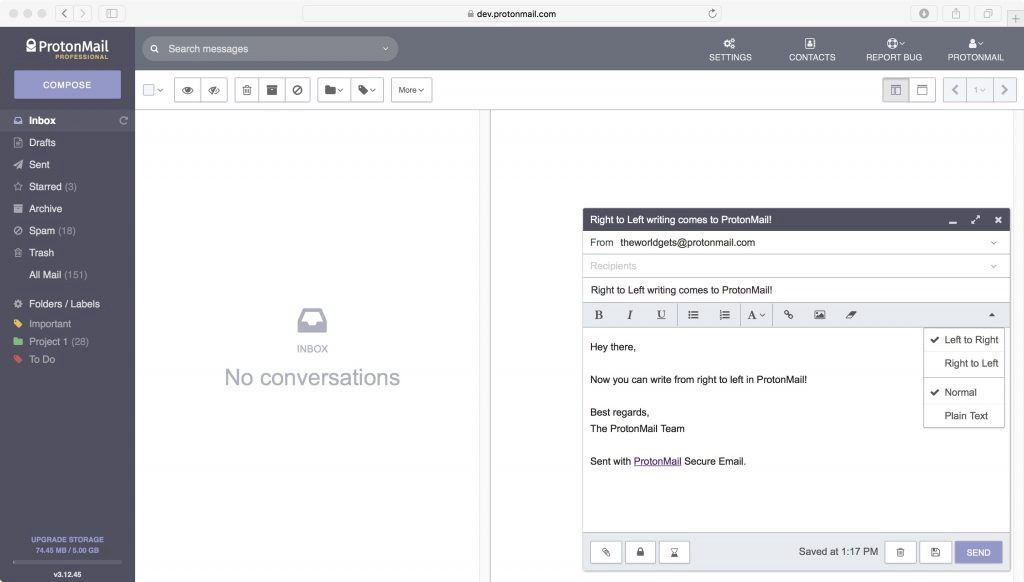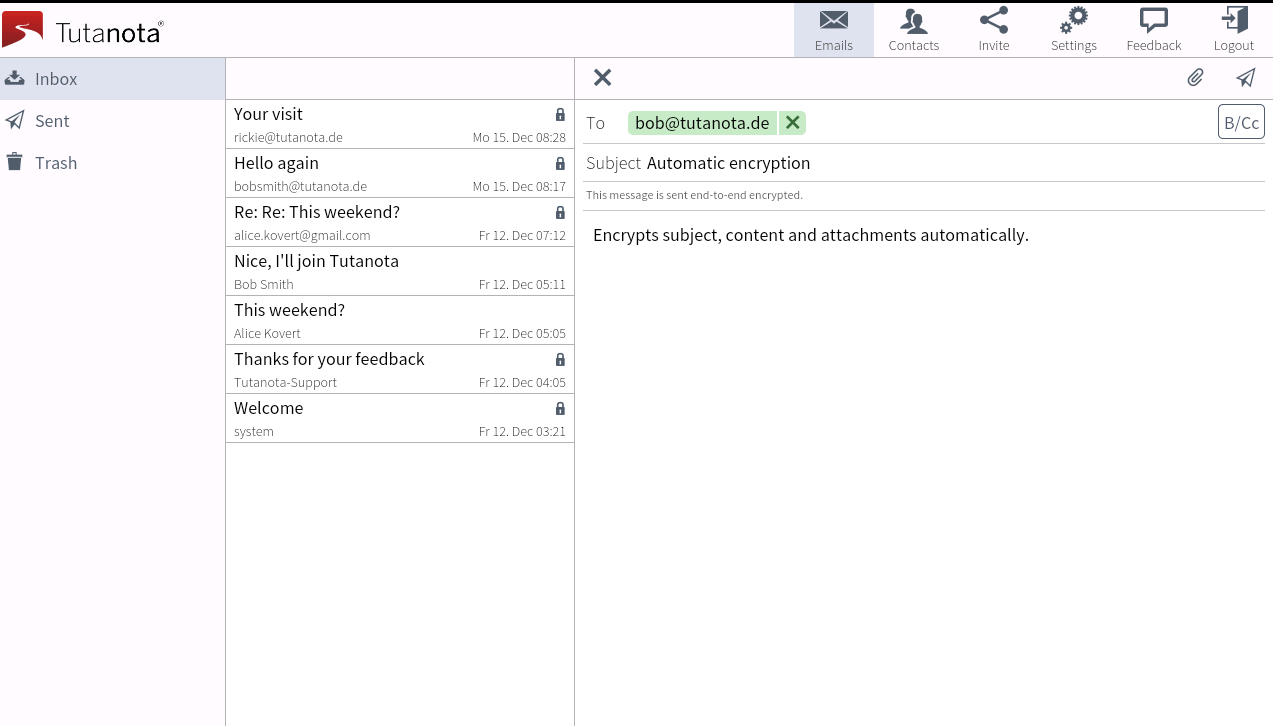


Many Internet users ask Qwant about the creation of an email service.
Our teams have been working on the subject for several months now. Creating a Qwant email service means ensuring total respect for privacy, guaranteeing end-to-end encryption, while allowing perfect interoperability with all other email service providers. It also means thinking about a sustainable, efficient service that offers a simple, fluid and secure experience.
It is therefore a real technical, economic, and human challenge that Qwant’s teams are committed to taking up!
That’s why, in the meantime, we offer several alternative email services that uphold the values of privacy.
Protect your communications
When you start to be interested in protecting your privacy online, one of the first things you want to protect is online exchanges. As such, messaging often poses real problems of data leakage.
While they are supposed to be private between two people, communications are often readable in clear on the network by digital companies. They use this information to analyze your habits and collect lists of your correspondents in order to create a “social graph” of your knowledge.
Free email services are remunerated by presenting advertising to their users. Some services have reached the point where they scan all your emails to present you with personalized advertising according to your habits. Some will say that they prefer to see personalized advertising rather than advertising that would not necessarily match their interests.
The problem is that today there are many reasons that lead the major platforms to read your emails and some services are certainly useful and lead users to concede their personal information more easily. By reading your emails, Google can inform you about bottlenecks or delays on your next flight, add appointments directly to your calendar or offer you to quickly respond to an email for you. These services include reading your emails by artificial intelligence, tracking your online visits and your location. In the future, it may include information collected by your personal assistant at home, your connected objects, smart watches or your vehicle. As artificial intelligence refines its intelligence, it becomes more and more greedy in raw material: information about you. In other words, analyzing emails to personalize advertising is a relatively minor problem when you consider the problem as a whole. The real problem is that the web economy built by these giants is based on surveillance.
Gmail is one of those players who use email to enrich its user profiles, and they say it loud and clear in their terms of use:
Our automated systems analyze your content (including emails) […] when sending, receiving and storing content. But beyond reading emails, Google uses Gmail as a Trojan horse that tracks a user in his web browsing on his PC, but also links this user to his smartphone, when he logs in with the same identifier.
That’s why getting rid of Gmail should be a priority for anyone who wants to limit their online tracking. Fortunately, there are many alternatives today!
Most Internet service providers offer mailboxes, often with webmail (ability to check your email from any web browser). Just search on the website of your access provider how to access webmail and communicate to your correspondents the address that was assigned to you when you took out your Internet subscription. However, this solution makes you dependent on this access provider, as your email address must change if you decide to use the services of another. We will see later that it is possible to manage your email from a personal domain name.
An email client like Mozilla Thunderbird (compatible with Mac, Windows and Linux) is free to download from https://www.mozilla.org/fr/thunderbird/. Like Firefox, it is free software also produced by the Mozilla Foundation.
Apple users (Mac, iPad and iPhone) can use the application Mail.app although it is the defect of not being free. For Android phones, we can use for example the free application K-9 Mail.
The settings needed to tell these software which mailbox to use are listed on your ISP’s website. The use of email software makes it easier to share the reading of the email on several devices, thanks to the use of the Imap protocol.
Nothing explained above is very complicated so don’t get discouraged right away! You can go further to get more control over your computer messaging. Let’s consider together some ideas on this subject.
Imagine an address with your prénom@nom.com, it would certainly make its little effect wouldn’t it? It is quite possible for everyone to have the equivalent, as long as you buy your own domain name. To do this, you have to go to companies like Gandi.net, Online.net or OVH.com that offer such services for about fifteen euros per year, including a domain name (if available) and one or more mailboxes, to offer as gifts to family members!

In the movie Imitation Game, cryptologist Alan Turing is tasked by the British government to unravel the secret of the famous German encryption machine Enigma, deemed inviolable.
You should know that when the email was invented, it was not planned to encrypt its content. And today, this is still the case: when you send an email to a correspondent, the message is relayed by several mail servers that are likely to read it. Sending an email today is a bit like sending a postcard without an envelope: postal workers can read it, even if we suspect that they do it only very rarely.
It is possible to encrypt your messages, but it requires a certain effort. The Free Software Foundation offers a good tutorial that explains how to do it: Email Self-Defense https://emailselfdefense.fsf.org/fr/. It is also possible to go to free events called “privacy cafés” https://xn--caf-vie-prive-dhbj.fr/. Led by volunteers, these are great opportunities to meet other people interested in encrypting their messages and learn how GPG or other encryption software works through an exchange of experiences.

If the technique puts you off but still want to switch to encrypted messaging, you might be interested in ProtonMail. The company is based in Switzerland offers an Open Source product, it is one of the most privacy-conscious messaging services for its users. Email exchanges are encrypted and self-destruct. However, it only provides 500MB of storage in its free version. If you want to make it your main email, you will have to opt for ProtonMail Plus for 48 € per year with 5 GB of storage, while ProtonMail Visionary costs 288 € per for 20 GB.
#LeSaviezVous @Qwant is not only your default search engine at Net-C but you can also very easily integrate the results of your searches on the net into the email. Here’s how… #NetC and #Qwant respect your #vieprivée pic.twitter.com/LAmWLeWxao
— Mailo (@HelloMailo) October 23, 2018
Net-C
is a French company that shares our virtuous concern to protect the privacy of users. This free messaging offers a very complete service with a junior version (Net-C Junior) so that children can enjoy secure messaging. On webmail, it is possible to send a registered or PGP-encrypted email. But that’s not all, Net-C offers a series of additional services accessible from a customizable dashboard with storage space for documents, photos, a favorites manager and an RSS feed reader. And you will notice very quickly that they have chosen a great search engine! In its free offer, the service offers 1GB of storage. To benefit from 20 GB of capacity + 5 GB of storage space, all without advertising, it will be necessary to pay 12 € per year.

Zoho Mail
is another alternative. This service is mainly aimed at professional users and includes an online office suite. It offers a free service with 5GB of email storage space for you to try out. The paid version costs €24 per year for 30GB of storage and offers other features such as domain name aliases and Microsoft Active Sync support.

Tutanota
is a service that was created following the revelations of Edward Snowden by 3 encryption experts, Tutanota has made data protection its hobbyhorse. In addition, the service encrypts not only messages, subjects, and attachments, but also lists of your contacts. All data passes through the company’s servers, which are located in Germany. The service creates public and private keys as soon as the account is created that will allow you to encrypt your exchanges. In its free version, Tutanota offers 1 GB of storage. With 12 € per year, the user has 1 GB of storage with a custom domain name and for 60 € per year, it is possible to go up to 10 Gb of storage.

FastMail
is a popular alternative because it offers good ad-free and track-free support but it is not free. The basic service with 2GB of storage costs $30 per year, while the higher version with 25GB costs $50, to upgrade to 100GB you’ll have to shell out $90 per year. It is possible to try the service for free for 30, note that a migration guide to help you migrate is offered.
To protect your privacy, try the Qwant search engine that does not collect your personal data.
For more tips on protecting your privacy, follow Qwant on its social networks (Facebook, Twitter, Linkedin) and join the Qwant Club on Telegram to exchange with our community.